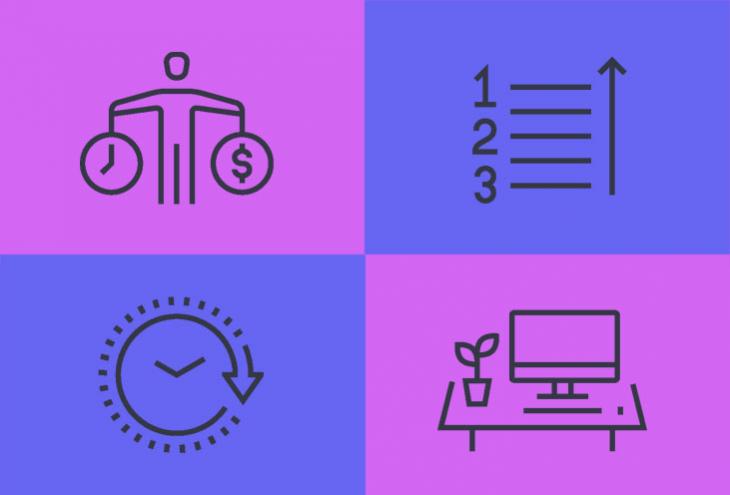Have you ever looked at the clock and wondered where the time went? You might hope the time flew by because you were diligently focused on work, but we’re all guilty of wasting time every now and again. If you’re finding that time is marching on, but you haven’t made much progress on your to-do list, check out these tips to help master time management — and finally finish that checklist.
Determine Your Peak Performance Time
What time of day are you most productive? This doesn’t have to be in the morning, as many suggest. Plenty of night owls do their best work in the evenings, and others are most productive in the afternoon. Track your efforts over the course of a week, and you should begin to notice periods of increased versus decreased productivity. That period when you are your most productive is your peak performance time. Once you know when this time is, try to organize your day to maximize that window.
Focus on the Most Important Tasks (MITs) First
Your most important tasks (MITs) are those that need to be accomplished before anything else. If you take on your biggest and most challenging tasks at the beginning of your day, you’re more likely to have plenty of time and energy to complete them. Taking on these tasks before you’re distracted by other work will make them seem less daunting, and can give you a sense of accomplishment that can help motivate you throughout the rest of your day.
Block Time
Busy professionals are pulled in so many directions it can be difficult to carve out the time needed to complete any task on your to-do list. To ensure that you have enough uninterrupted time, set continuous blocks on your calendar to give yourself the bandwidth to focus on the task at hand.
Focus on Your Own Work
If you’re like most professionals, you sometimes feel overwhelmed by your workload. A large part of the reason is you’re doing work that isn’t yours! Because you want to help your colleagues, you sometimes take on work that isn’t strictly your role. Helping a coworker who is out of the office or over their head is collegial, but be sure that temporary work and responsibility returns to its original owner. Take stock of your current workload. Are your tasks truly your responsibilities? If not, think about what tasks you may be able to delegate or remove, and then work on doing so.
Take Breaks
We’re all guilty of thinking if we just push a little bit longer, we’ll make more progress and finish the task at hand. Unfortunately, that effort can backfire. Instead of pushing until you’re exhausted, take a break. A quick walk or stretch can reinvigorate you, and may actually give you more energy and a clearer head to finish the task before you. There is no award for working nonstop.
Know When to Stop
Just as important as knowing when to take a break is knowing when to stop for the day. There will always more on the list than you are able to accomplish in a day. Don’t despair. Set a time to end your day and stick to it. When you don’t give yourself time to relax and recharge, you risk making mistakes and taking longer to complete tasks. By ending your day at a set time, you’ve set a healthy boundary that allows you to separate the work and nonwork times in your day. It also allows you the ability to effectively prep for the next day, to ensure you’ll be just as productive tomorrow.
There is no one-size-fits-all plan for mastering time management, but the tips outlined here can help you determine what works best for you. Once you recognize what works well, try to gradually incorporate those steps into your day, and soon effective time management will become second nature.
 On Topic
On Topic
Joaquin R. Gallegos, Jicarilla Apache Nation/Santa Ana Pueblo, recently served as a law clerk to the Honorable Allison H. Eid on the U.S. Court of Appeals for the Tenth Circuit. Prior, he served as a legislative staff attorney to the Mille Lacs Band of Ojibwe. He has also served as a legal fellow to then-Vice Chairman U.S. Senator Udall (ret.) on the Senate Committee on Indian Affairs and as a policy fellow to U.S. Senator Dorgan (ret.) at the Aspen Institute. Before law and policy, Gallegos worked in health care and research across Indian Country.
What are three strategies to help employees maintain focus and productivity in a busy office setting after many months of working remotely?
To renew ambition, remember that we are part of something greater than ourselves because our work and contribution elevates our families, Indian Country, and beyond.
Actively communicate because connecting and exchanging ideas empowers relationships and trust. And deliberately fix time for reflection and short breaks because recharging ourselves fuels innovation and fulfillment.
As our surroundings influence our well-being, reimagine the physical spaces we work in to stimulate curiosity and help form solutions to the professional problems we face.













